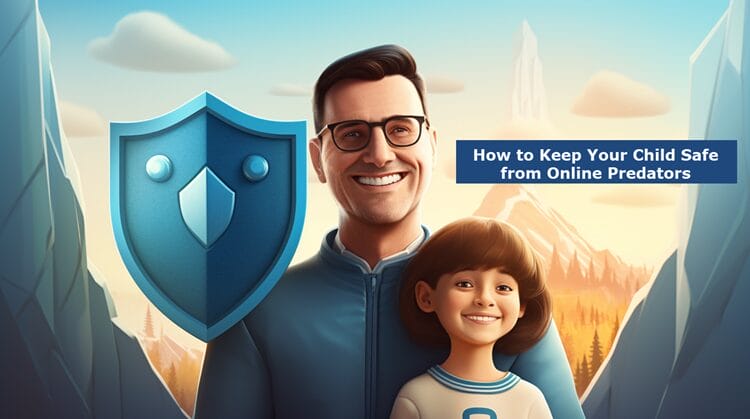11 Ways to Keep Your Child Safe from Online Predators
You might be thinking, ‘I can’t possibly monitor everything my child does online, so how can I really protect them from online predators?’
The Internet Watch Foundation has raised alarm about the “astounding” magnitude of dangers children face from online predators.
While it’s true that the online world can be vast and daunting, there are practical steps you can take to mitigate the risks and keep your child safe.
By implementing a few key strategies and fostering open communication, you can empower your child to navigate the digital landscape responsibly.
So, where do you start?
Let’s explore some effective ways to safeguard your child from online predators and ensure their online experience is as secure as possible.
Key Takeaways
- Teach caution and skepticism toward online relationships
- Emphasize the importance of not sharing personal information with strangers
- Encourage reporting any uncomfortable or suspicious encounters
- Establish trust and support by letting the child know they can come to you for help
What Are the Best Ways to Keep Your Child Safe from Online Predators?
Please, find below some of the best ways to make sure your kids are safe from predators while online:
#1. Initiate a Conversation with Your Child Regarding Online Predators

To ensure your child’s safety online, it’s crucial that you proactively initiate a conversation about online predators.
Monitoring their online activities and discussing the dangers of online predators can help protect them from potential harm.
Start by explaining to your child that there are people on the internet who may pretend to be someone they’re not, with the intention of causing harm.
Teach them to be cautious and skeptical of anyone they meet online, especially those who try to establish personal relationships quickly.
Emphasize the importance of not sharing personal information, such as their full name, address, or school, with strangers online.
Encourage them to talk to you if they ever feel uncomfortable or suspicious about someone they encounter on the internet.
Make sure your child understands that they can always come to you for help and support.
#2. Explore Risky Behavior and Its Consequences Together
It is important to further protect your child by exploring risky behavior and its consequences together. By doing so, you can help your child understand the potential risks they may encounter online and teach them how to make responsible choices.
Start by explaining what risky behavior entails. This includes sharing personal information, engaging with strangers, or participating in inappropriate conversations or activities.
Emphasize the potential dangers of these actions and how they can make your child vulnerable to online predators.
Next, discuss the consequences of risky behavior. Help your child understand that their actions can have long-lasting effects, both online and offline.
Explain that sharing personal information can lead to identity theft or cyberbullying while engaging with strangers can put them at risk of grooming or exploitation.
Encourage open communication and let your child know they can come to you if they encounter any suspicious or uncomfortable situations online.
Teach them how to identify red flags, such as requests for personal information or inappropriate discussions.
Emphasize the importance of reporting such incidents to you or a trusted adult.
#3. Define and Recognize Risky Relationships in the Online World

What are the signs of risky relationships in the online world that you should be aware of to keep your child safe?
It’s crucial to understand the warning signs and recognize when your child might be in a potentially dangerous situation.
Unacceptable behavior in online relationships includes excessive secrecy, sharing personal information with strangers, sudden changes in behavior or mood, and withdrawal from family and friends.
Keep an eye out for any adult who consistently tries to isolate your child from their support network or exhibits controlling behavior. These can be red flags indicating a predatory relationship.
Sexual predators often groom their victims by gaining their trust, offering support, and showing understanding. They may use flattery, gifts, or even threats to manipulate and control your child.
It is essential to educate your child about the tactics used by these predators and encourage open communication about any online interactions that make them uncomfortable.
#4. Caution Your Child About the Hazards of Engaging in Chat Rooms
Be cautious and educate your child about the hazards of engaging in chat rooms. While chat rooms can be a fun way for children to connect with others online, they also pose significant risks.
It is crucial to teach your child about the potential dangers and how to stay safe while using chat rooms.
Here are five important points to discuss:
- Never share personal information: Emphasize the importance of keeping personal information private, such as full name, address, phone number, and school name.
- Be wary of strangers: Remind your child to be cautious when talking to people they don’t know in real life. Not everyone online is who they claim to be.
- Avoid meeting offline: Make it clear that meeting someone from a chat room in person is never a good idea, as people may not have good intentions.
- Report suspicious behavior: Teach your child to immediately report any inappropriate or suspicious behavior they encounter while chatting online.
- Use secure platforms: Encourage your child to use secure chat platforms that prioritize privacy and safety, such as kid-friendly chat apps or moderated chat rooms.
#5. Advise Your Child on the Risks of Online Flirting

Caution your child about the potential risks and dangers of engaging in online flirting. While it may seem harmless and fun, your child needs to understand the potential consequences.
Online predators often use flirting as a tactic to gain the trust of unsuspecting victims. They may pretend to be someone they’re not, manipulating your child into sharing personal information or engaging in inappropriate conversations.
It is crucial to remind your child that giving consent for any form of communication or interaction online is never mandatory. Encourage them to trust their instincts and to immediately report any suspicious or uncomfortable situations to you or a trusted adult.
To protect your child from online predators, establish clear boundaries and guidelines for online interactions.
Encourage your child to only engage with people they know in real life and to avoid engaging in any form of online flirting.
#6. Address the Issue of Sharing Inappropriate Content, Including Sexy Selfies
Ensure your child understands the importance of not sharing any inappropriate content, including sexy selfies, online. It’s crucial to address this issue as it can have serious consequences for your child’s safety and well-being.
Here are some practical steps you can take to tackle this problem head-on:
- Open communication: Create a safe space where your child feels comfortable discussing their online experiences. Encourage them to share any concerns or incidents involving inappropriate content.
- Educate about consequences: Explain the potential risks associated with sharing explicit or suggestive photos online. Help them understand that once a photo is shared, it can easily be disseminated and can have long-term consequences for their reputation and future opportunities.
- Promote healthy self-esteem: Talk to your child about the importance of valuing themselves for who they are, rather than seeking validation through online attention. Help them build a strong sense of self-worth that isn’t dependent on others’ approval.
- Encourage critical thinking: Teach your child to critically evaluate requests for explicit content. Discuss the tactics used by online predators, such as grooming techniques, and empower your child to recognize and avoid manipulative behavior.
- Monitor online activity: Regularly check your child’s online presence and remind them that you’re there to support and protect them. Install parental control software to help filter inappropriate content and keep them safe.
Related: Review of uMobix
#7. Emphasize Offline Safety Rules for Comprehensive Protection

To ensure comprehensive protection for your child, it’s essential to emphasize offline safety rules alongside online precautions.
While educating your child about the dangers of the internet is crucial, teaching them about offline safety measures is equally important. Kids need to be taught about consent and how to recognize and respond appropriately to uncomfortable situations, both online and offline.
Start by having open conversations with your child about consent. Teach them that it’s okay to say no to any physical contact or activities that make them uncomfortable.
Encourage them to trust their instincts and seek help from a trusted adult if they ever feel unsafe.
Emphasize the importance of respecting others’ boundaries and obtaining consent before engaging in any physical interactions.
Additionally, talk to your kids about inappropriate content online, but don’t forget to address offline scenarios as well.
Teach them to be cautious around strangers, whether it’s in person or online. Make sure they understand the need to keep personal information private and avoid sharing it with anyone they don’t know well.
#8. Evaluate the Use of Surveillance Software to Safeguard Your Child
Consider using surveillance software to protect your child online. With the increasing prevalence of cyber threats, it’s essential to take proactive measures to ensure your child’s cybersecurity.
Surveillance software can provide an additional layer of protection, allowing you to monitor your child’s online activities and detect any potential dangers.
Here are five reasons why you should evaluate the use of surveillance software:
- Real-time monitoring: Surveillance software allows you to keep track of your child’s online interactions in real-time, giving you immediate alerts if any suspicious activity is detected.
- Content filtering: Many surveillance software options offer content filtering capabilities, allowing you to block certain websites or limit access to inappropriate content.
- Social media monitoring: With surveillance software, you can monitor your child’s social media accounts, ensuring they aren’t engaging with potential predators or sharing sensitive information.
- Location tracking: Some surveillance software includes GPS tracking, enabling you to know your child’s whereabouts and ensure their safety when they’re outside.
- Peace of mind: Using surveillance software can give you peace of mind, knowing that you’re doing everything possible to protect your child from online threats.
When considering the use of surveillance software, it is essential to have open and honest conversations with your child about why you’re implementing this technology to protect them.
It is also crucial to strike a balance between protecting their safety and respecting their privacy.
Remember, technology is just a tool to support your efforts as a parent in keeping your child safe in the digital world.
Related: The Best Hidden Spy Apps for Android
#9. Reinforce the Importance of Open Communication with Your Child

Now that you have evaluated the use of surveillance software to safeguard your child online, it’s important to reinforce the importance of open communication with them. Open communication is crucial for ensuring your child’s safety in the digital world.
By maintaining a strong line of communication, you can establish trust, build a supportive relationship, and provide guidance when it comes to navigating online risks.
Encourage your child to share their online experiences with you regularly. Create a safe and non-judgmental environment where they feel comfortable discussing any concerns or issues they may encounter.
Let them know that you’re there to listen, understand, and help them make informed decisions.
Teach your child about the potential dangers they may face online, such as cyberbullying, grooming, or inappropriate content.
Discuss the importance of setting boundaries, being cautious when sharing personal information, and avoiding interactions with strangers. Emphasize that they should never be afraid or ashamed to seek your guidance or support.
Furthermore, educate yourself about the latest trends and platforms your child uses. This will enable you to have informed conversations and better understand the potential risks they may encounter.
Stay up to date with privacy settings and parental controls to ensure their online safety.
#10. Delve into What Constitutes an Online Predator through Honest Conversations
Understanding the characteristics and tactics of an online predator is essential in keeping your child safe in the digital world.
By having honest conversations with your child about what constitutes an online predator, you can equip them with the knowledge and awareness they need to stay safe online.
Here are five key points to discuss:
- Online predators disguise themselves as friendly and trustworthy individuals, often using fake profiles and identities.
- They manipulate their targets by building trust and forming emotional connections.
- Online predators may try to exploit your child’s vulnerabilities, such as insecurities or desires for attention and validation.
- They use various tactics to groom their victims, including flattery, gifts, and promises of fame or success.
- Online predators may operate on the dark web, where illegal activities and trafficking occur.
#11. Instruct Your Child on the Necessity of Limiting Personal Information Online

To keep your child safe online, it is crucial to teach them the importance of limiting personal information shared on the internet.
Online predators are always on the lookout for vulnerable targets, and providing too much personal information can make your child an easy target.
Here are some practical tips to help your child understand the necessity of limiting personal information online:
Firstly, teach your child to be cautious when sharing personal details such as their full name, address, phone number, school information, or any other identifying information. Encourage them to only share this information with trusted friends and family members.
Secondly, instruct your child to be mindful of the information they post on social media platforms. Remind them that anything they share online can be seen by others, including online predators.
Encourage them to set their privacy settings to limit who can see their posts and to avoid sharing personal details in their public profiles.
Additionally, remind your child to avoid revealing personal information in online chats or messages.
Encourage them to use screen names or usernames that don’t give away their real identity. Teach them to be cautious of people they meet online and to never share personal information with strangers.
Conclusion
So there you have it, dear parent. By following these practical tips, you can ensure the safety of your child from those sneaky online predators.
Remember to have honest conversations, set boundaries, and monitor their online activities.
Because nothing says ‘I love you’ more than spying on your child’s every move.
Stay vigilant, keep those surveillance software running, and rest assured that your child will be safe from the terrifying world of the internet.
Frequently Asked Questions
1. What are the best ways to protect my child from online predators?
To protect your kid from online predators, it is crucial to teach your child about online safety.
Make sure they understand the dangers of interacting with strangers online and emphasize the importance of safety measures when using apps, chat rooms, and social media platforms.
2. How can I monitor my child's online activities without invading their privacy?
It's important to monitor your child‘s online activities to ensure safe online experiences. However, it's equally essential to encourage open conversation and teach your child about safe online behavior.
Openly discuss the risks of interacting with strangers and the potential danger of sharing personal information online.
3. Are there specific signs that indicate my child is communicating with an online predator?
It's important to pay attention to any uncomfortable or weird behavior your child exhibits after using their phone or device.
If your child seems secretive about their online activities, is receiving excessive messages from strangers, or suddenly starts avoiding discussions about their online interactions, it could be a sign that they're being targeted by an online predator.
4. What measures can I take to prevent my child from meeting online predators?
It's vital to talk with your child about the potential dangers of meeting someone they've only interacted with online.
Emphasize that they should never agree to meet anyone in person without your knowledge and encourage your child to come to you if they have any concerns about someone they've been talking to online.

